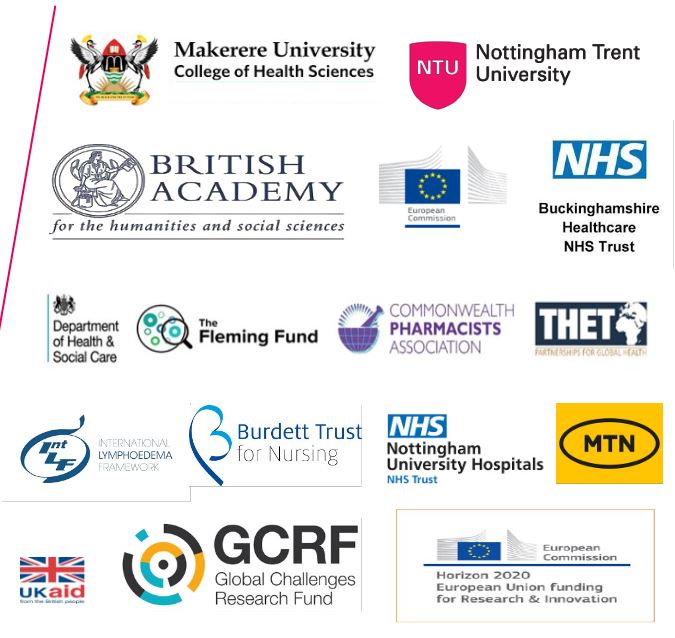Overview
The Lymphoedema in Uganda project is part of the NTU - Makerere University Partnership and began a couple of years ago when Professor Linda Gibson invited Professor Christine Moffatt to visit Uganda and Makerere University’s School of Public Health and Nursing Department to discuss lymphoedema and its disease burden in Uganda.
Professor Moffatt heads 'The International Lymphoedema Framework' (ILF), an international charity, whose mission is to develop effective Lymphoedema care throughout the world. The LIMPRINT study is an international epidemiology study with 9 countries that has defined the size and impact of the condition on health services and this work in Uganda will be the first low resource country to undertake the work.
Initially we conducted two different stakeholder workshops (2022/23) with community health workers, district health officers, people living with lymphoedema (PLWL), traditional healers, and policy makers including a representative from the Ministry of Health. A site visit to a marginalised rural community in Buvuma Island highlighted the unknown magnitude, functional impact and risk factors associated with lymphoedema in Uganda.
There was clear evidence that there was a lack of a comprehensive understanding of lymphoedema both by the people suffering from the condition and the health workers supposed to provide care for patients in Uganda. This was exacerbated by the inadequate healthcare infrastructure, shortage of trained health care workers and limited resources. Myth and stigma also played a large part in misunderstanding the causes of lymphoedema and highlighted the need for a deeper understanding in the misconceptions that deter PLWL from getting the recommended medical care – though health system challenges provide strong barriers to this.
The global programme to eliminate Lymphatic Filariasis (LF) initiated by the World Health Assembly in 1997 and the launch of the program by WHO in 2000 demonstrated the global importance of addressing lymphoedema and its associated morbidities (WHO, 2021a). By the end of 2018, Uganda was among the many African countries that had scaled up MDA to all endemic districts but still awaits validation as having eliminated LF as a public health problem based on the four-year threshold (WHO, 2019a). While a lot of progress has been made towards MDA, morbidity management and disability prevention remain a challenge because of the unknown prevalence and the existing health systems challenges.
Related Publications
- Arthur Bagonza, Linda Gibson, Lydia Kabiri, Chris Bezalel, Saravu Rama Bhat Narahari, Peter J. Franks, David Musoke, Christine Moffatt. Exploring barriers to accessing treatment for Lymphatic Filariasis through a socio-ecological lens in Buvuma and Napak districts, Uganda. Published: January 9, 2025.
Related EAC Research and Partnership Pages
- NTU - MAK Partnership - EAC Website Partnership and Research Page
- The Global Capacity Building Programme (GCBP): ''Strengthening leadership and management among local government health managers in Wakiso district, Uganda.”
- Commonwealth Partnership for Antimicrobial Stewardship (CwPAMS) - EAC Website Partnership and Research Page
- NTU-Mak Partnership – Strengthening health systems: Community Health Workers in Uganda - EAC Website Partnership and Research Page
- NTU Eastern Africa Centre (EAC) Student Profile: Grace Biyinzika Lubega
- Community-based approaches for antimicrobial stewardship using a One Health approach - EAC Website Student Research Page - Grace Biyinzika Lubega
- Social Innovation and Health Technologies for Community Health Workers: An Afro-centric Perspective - Michael Obeng Brown
- NTU-Mak Partnership marks World AMR Awareness Week - November 2024
